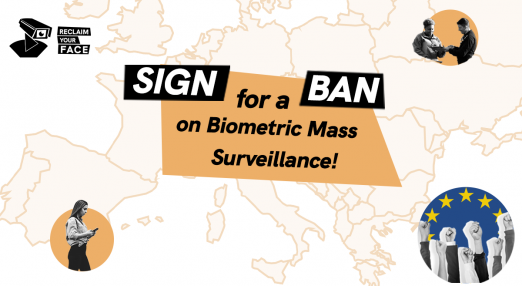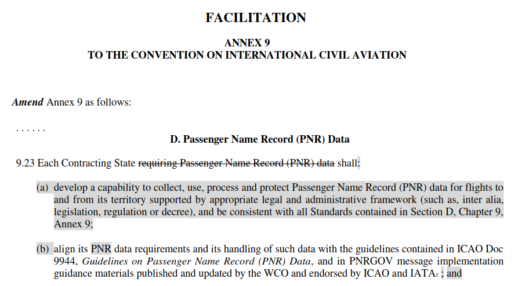mass survaillance
Filter by...
-

New ECI calls Europeans to stand together for a future free from harmful biometric mass surveillance
The Reclaim Your Face coalition launches a European Citizens’ Initiative (ECI) today to ban biometric mass surveillance. The ECI represents the voice of those who oppose a dystopian future and instead want a future in which choices are made by us, not by algorithms. The initiative needs to collect 1 million signatures in at least 7 EU countries during the next year.
Read more
-

Q&A: PI case – UK High Court judgment on general warrants and government hacking explained
EDRi member Privacy International (PI) explain in some detail what their case involving UK intelligence services using general warrants is about.
Read more
-

EDRi-gram, 14 October 2020
The public are being treated as experimental test subjects: across these examples, it is clear that members of the public are being used as subjects in high-stakes experiments which can have real-life impacts on their freedom, access to public services, and sense of security.
Read more
-

ICAO mandates worldwide government surveillance of air travelers
Playing out the endgame we predicted last year of a two-decade campaign by the US government to establish a global regime of government surveillance of air travelers, the International Civil Aviation Organization (ICAO) has adopted an amendment to the Chicago Convention on Civil Aviation that will require each of the 193 state parties to that treaty — essentially every national government in the world — to require all airlines operating international flights to provide a designated government agency with complete mirror copies of all reservation records (“Passenger Name Records“) in a standard PNRGOV transmission format.
Read more
-

EDRi submits response to the European Commission AI consultation – will you?
Today, 4th June 2020, European Digital Rights (EDRi) submitted its response to the European Commission’s public consultation on artificial intelligence (AI). In addition, EDRi released its recommendations for a fundamental rights-based Artificial Intelligence Regulation.
Read more
-

What digital rights are at imminent risk? All of them.
Our civil rights in the digital environment are based on our rights to protect our personal security and data, our right to communicate freely, and our right for any restrictions to be necessary, predictable and proportionate. Every one of these rights is now under imminent threat.
Read more
-

French surveillance bill pushed ahead despite massive criticism
On 19 March 2015, France proposed a new bill that would allow intelligence services to collect vast amounts of data, to tap phones and emails without permission from judges. The scope of application of the draft bill is extremely broad and covers the following ill-defined areas: National independence, territorial integrity and national defence Foreign policy […]
Read more
-

PEN report reveals concerns about the impact of mass surveillance
On 5 January 2015, PEN American Center published a report “Global chilling: The impact of mass surveillance on international writers”. The report introduces the results of a survey of writers, to investigate how mass surveillance influences their thinking, research and writing, as well as their views of government surveillance by the US and its impact […]
Read more
-

Romanian cybersecurity law sent to the Constitutional Court
A new law on cybersecurity, previously reported in the EDRi-gram, was adopted by the Romanian Parliament at the end of 2014. The law gives the Romanian Intelligence Agency (SRI) access to any computer data owned by private companies, without a court order. The proposal was tacitly adopted by the Chamber of Deputies on 17 September. […]
Read more
-

UN calls for balance between privacy and security
In a special discussion at the Human Rights Council in Geneva, Flavia Pansieri, the United Nations (UN) Deputy High Commissioner for Human Rights, expressed her concern about increasing mass surveillance programs conducted by states and private corporations. Ms. Pansieri highlighted the importance of demonstrating that interferences with an individual’s right to privacy are both necessary […]
Read more
-

Denmark about to implement a nationwide ANPR system
The Danish police is planning to implement a nationwide automatic number plate recognition (ANPR) system over the next couple of years. The Danish newspaper Berlingske obtained the project description for the IT system through a Freedom of Information Act (FOIA) request, and reported about the ANPR plans. The ANPR system will consist of mobile units […]
Read more
-
Irish High Court refers the Facebook/PRISM case to the CJEU
On 18 June 2014 Ireland’s High Court referred the request to investigate Facebook’s international headquarters in Ireland over its involvement in the PRISM scandal to the European Court of Justice (CJEU). CJEU was asked to review the case and to clarify whether the social network’s actions are compatible with the EU Charter of Fundamental Rights. […]
Read more
